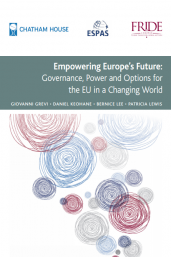
Empowering Europe’s Future: Governance, Power and Options for the EU in a Changing World

Executive Summary Excerpt
Looking to 2030, global change will be occurring at an accelerated pace and in an unpredictable fashion. The world in 2030 will be a more fragile place due to the rise of economic interdependence, the diffusion of power, and the disruptive potential of technological innovation and extreme events. Ten years ago, for example, the SARS outbreak cost businesses $60 billion – and caused the loss of about 2% of East Asian GDP. Vulnerability to unexpected events – such as the 2010 Icelandic ash-cloud or the 2011 Japanese tsunami – will only increase as global supply chains expose states and societies to the effects of political crises and disruptions, even in distant regions. Weak or rigid governance systems will increasingly struggle to respond to these trends.
In this less predictable world, power shifts will not be linear, not least due to the proliferation of domestic challenges in emerging economies. Whether they are in relative rise or decline, the risk may be that many governments become more introverted and less inclined to international engagement and compromise, as they cope with increasing turbulence at home. Conversely, a faster-changing world will offer wide-ranging options and new opportunities to more actors – both state and non-state – who are flexible and quick enough to seize them. Cities may lead efforts to reduce carbon emissions; smaller states, like Sweden, Singapore or Qatar, may shape international agendas and regional affairs through the use of technical leadership or coalition-building. Power shifts will not necessarily be a zero-sum game; the gains of some need not entail losses for others.
- Issue:
- Global and Domestic Governance
- Regions:
- Europe, Global
- Year Published:
- 2013
- Authors:
- Giovanni Grevi, Daniel Keohane, Bernice Lee, Patricia Lee
- Institutions:
- European Strategy and Policy Analysis System (ESPAS), FRIDE Think Tank, Chatham House, the Royal Institute of International Affairs

